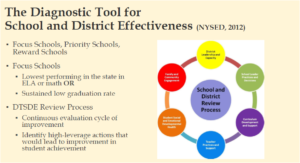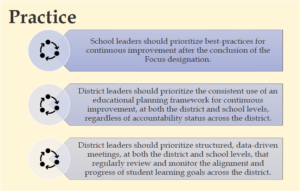Exploring the Role of Secondary Principal Leadership in Advancing the School Improvement Process
By April Prestipino
Tools on Principal Leadership Actions

In the 2012-2013 school year, the New York State Education Department (NYSED) deployed the Diagnostic Tool for School and District Effectiveness (DTSDE), to support low-performing schools (e.g., Focus Schools or Priority Schools) with implementing research-based improvement strategies. The DTSDE is a comprehensive rubric designed to assist principals of these schools with the process of improving student performance on state assessments and/or increasing graduation rates. It draws on research-based literature on systems leadership that has identified specific high-leverage leadership actions and behaviors that have typically resulted in a culture of continuous improvement. Along with the tool, a detailed process of external and internal review requires identified schools to annually assess and report progress to NYSED. April Prestipino’s dissertation study examines the work in Focus schools, defined by NYSED as schools that are among the lowest performing in the state for graduation rates for combined English language arts or mathematics achievement in which an accountability group is not making progress.
Her research takes an in-depth look over time at secondary schools prior to being designated as a Focus school, during the designation, and post designation. The study used interviews with superintendents, principals, and teachers as well as relevant document review to explore the actions of secondary school principals as they navigated the DTSDE rubric and process.
Findings
The findings showed that in all four schools there was an overall lack of intentional leadership actions needed to promote a culture of continuous improvement prior to the Focus designation. For all schools, mandated participation in the DTSDE process led to an overall increase in the intentional leadership actions needed to establish a foundation for continuous improvement during the Focus designation. However, in three of four schools there was an overall decline in the consistency of the leadership actions needed to support a culture of continuous improvement after the conclusion of the Focus designation.
Ultimately, there was no evidence to suggest that three out of four of these school leaders connected the DTSDE process with the importance of maintaining a research-based leadership framework model for continuous improvement. Thus, this study found that the DTSDE process did not sufficiently influence these school leaders’ actions and behaviors to actively sustain a collaborative, data-driven system that targeted the individual needs of students beyond the conclusion of the Focus designation.
The Sustainability of Continuous Improvement

Even though the DTSDE process did not influence the long-term actions and behaviors for three out of four school leaders, there was one school leader who spoke about the positive influence of the DTSDE process. Interview responses from this case referred to the continued prominence of the mission and goals articulated in a dynamic strategic plan, collaborative professional learning opportunities for staff, the use of research-based instructional practices that deepen student learning, and monitoring the outcomes of goals through the regular analysis of data and shared accountability. Perhaps most importantly, the district leader was an active member of the improvement process, expanding the expectation for continuous improvement to all the schools in the district.
Almost a decade after its inception, the DTSDE process is still a major component of the mandated improvement process for identified schools in New York State as part of the accountability requirements under the Every Student Succeeds Act (ESEA). While the DTSDE may be a catalyst to start the improvement process, the sustainability of continuous improvement is a direct result of school leaders’ actions and behaviors, suggesting that New York State may want to examine the current structure of the DTSDE process.
For more on April Prestipino’s dissertation topic see background on NYKids DTSDE research, and check out NYKids blogs on continuous improvement for guidance on sustaining a culture of improvement in your own district or school.
